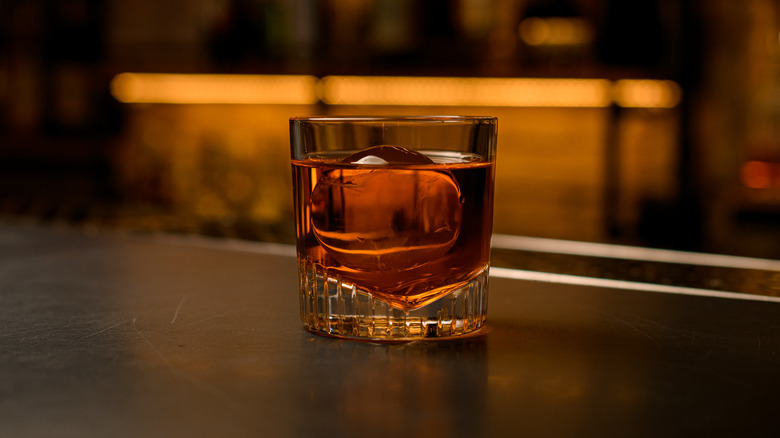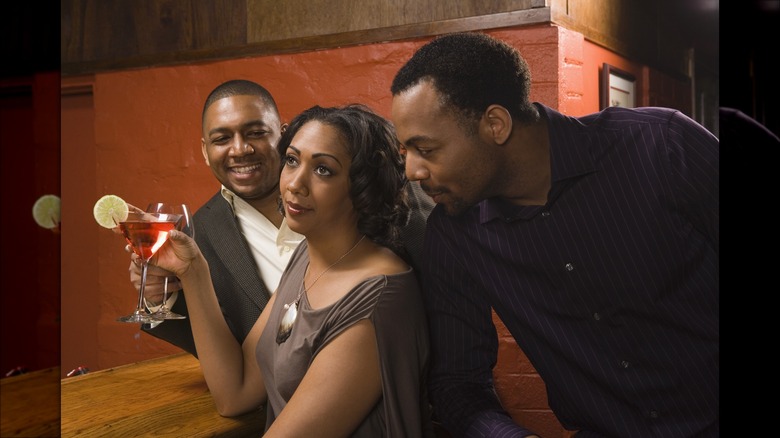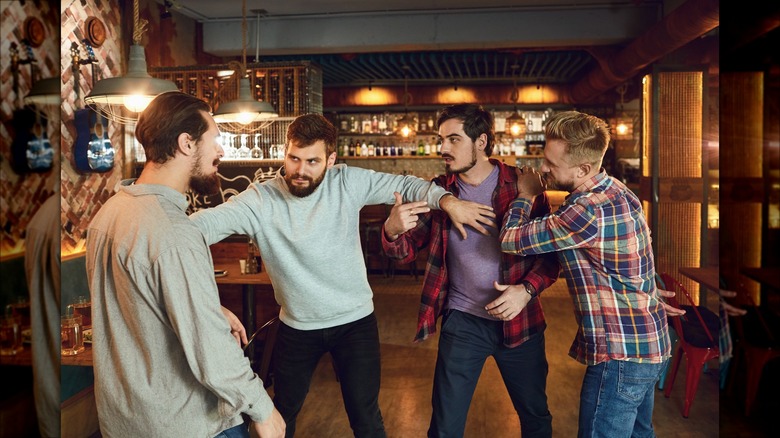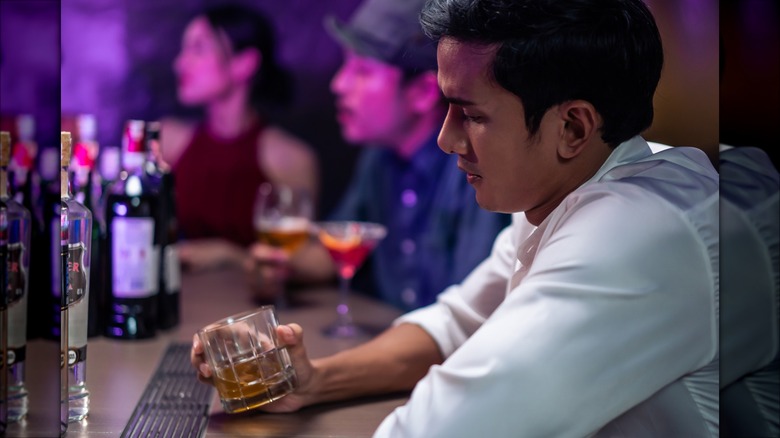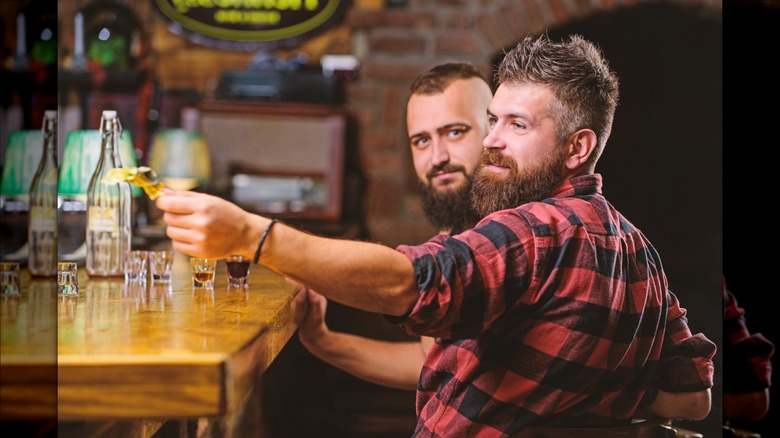The 5 Types Of People In A Bar That Ruin My Night Every Time
I sometimes sit and ponder just how much time I've spent in bars over the few decades, as I'm the very definition of an enthusiastic drinker. However, I don't only love bars for the endless supply of booze. What I really appreciate is the atmosphere of fellowship. Bar-goers are always happy to engage in illuminating conversations, whether they involve the day's prevailing social issues or if it's ever acceptable to dip your French fries in mustard. (It is, and may God have mercy on your soul if you claim otherwise.)
I've spent time on both sides of the bar, which has provided me with some interesting points of view. There are few jobs harder than bartending — and I don't mean just from a physical perspective. Spending time around drunk people while sober is, simply put, excruciating. Drunk people are like enormous toddlers: They have little control over their bodies, are fond of telling you the same story repeatedly, and often experience fits of rage when things don't go their way. And those are just your run-of-the-mill over-indulgers. Indeed, there's an all-out cabal of bar patrons whose presence can quickly turn a fun and carefree evening into an exercise in misery, and I'm pretty sure I've identified each and every type.
The lothario
While it's possible to chat up a comely stranger and not be a total dingus about it, lotharios enter bars looking for love by any means necessary. They're less concerned about making a genuine connection with another human being and more concerned about not spending another night alone. They can be identified by their various war cries of "What do your tattoos mean?" "Do you have a boyfriend/girlfriend?" and the always cringeworthy "Can I have a hug?" (No, you cannot have a hug, I don't even hug my friends and family because I am emotionally stunted.)
I'll never forget the man who plopped down in the seat next to me without warning or invitation. He disclosed that he found me cute, but was shocked that I "wasn't an idiot" upon talking to me. I'm not sure what it is about my appearance that communicates "dullard," but thankfully, I had this guy to assure me that I'm of average intelligence. Upon my telling him I was a writer, he scoffed and claimed it wasn't a real job (which is a viewpoint I wish the IRS also held). Most insultingly, he criticized the appearance of my favorite glasses. After this absolute dumpster fire of an interaction, this guy had the audacity to become irritated that I wouldn't accept a ride home. He claimed my personal safety could be at risk if I walked alone — which is ironic, considering he exuded some strong Ted Bundy vibes.
The aggressor
I avoid rowdy bars these days in favor of subdued, friendly spaces. And while I never actually partook in a bar brawl, I had a friend who seemed to attract trouble wherever she went. Well, she didn't attract it as much as go hunting for it at every possible opportunity. Casual glances from other bar-goers became invitations to violence. Accidental bumps in crowded spaces were a capital offense. Innocent comments were akin to proclamations of war. Her behavior most likely sprung from a combination of insecurity and a naturally aggressive nature, but I soon became very weary of nights out descending into screaming and threats of violence.
Alcohol is often referred to as a social lubricant, but it can also be considered a social irritant. And while I do have some modicum of sympathy for anyone who feels so deficient on a personal level that they're ready to come to blows over an imagined slight, I have no time for these behaviors in my life. People who fight in bars deserve a mouthful of pepper spray and a swift kick in the backside as they're being "helped" out the front door.
The cryer
For a time, there was an older lady I used to be friendly with who would use a curious tactic any time she felt she wasn't the center of attention at a local bar. The long and short of it? Her chin would begin to tremble as conversation happily flowed around her and as people traded insights and jokes — basically, if anyone was generally having a well time. Next, her eyes would fill with tears. At this point, some kindhearted individual would inevitably take the bait and ask what was wrong. At that point, the floodgates would burst open.
Let's face it: Alcohol and emotions don't always play nice. (Especially when some evil jerk decides to queue up Fleetwood Mac's "Landslide" on the jukebox after you've had four shots of Patron.) I certainly don't slight anyone for losing their cool in public, especially when going through a difficult time. In this specific instance, however, there was something calculated about this lady's frequent crying jags. It was as though she was using them to manipulate the feelings of others, and not because she was experiencing an overwhelming swell of emotion. In the end, we eventually fell out because I failed to respond sufficiently to her daily trauma dump, which was honestly the best-case scenario for all involved.
The lousy tipper
Tipping culture is a hot-button topic these days, but the simple truth is that tipped workers in America cannot survive without gratuities. As a result, if you plan on visiting a bar, you better plan on tipping, unless you receive service so poor that it can be taken as a personal affront. Case in point? In college, I had the distinct pleasure of working at a local private VFW bar. One guy never failed in leaving me a shiny quarter, no matter how much he drank, or how fast I was with his 7 and 7s. (Gee, a whole quarter! Now I can finally buy that gumball I've been eyeing.)
When it comes to bar tipping etiquette, one dollar to two dollars per drink is standard when paying with cash. When paying with a card, 20% is the baseline. If you're a regular at an establishment, take good care of your bartenders, because they take good care of you. In addition to simply being the right thing to do, tipping your regular bartender generously usually ensures that you receive top-notch service every time you swing by.
The undeterred conversationalist
During a recent solo bar excursion, I watched a man basically interrogate a stranger for a solid 30 minutes. The conversation ranged from the stranger's ethnic origins (which is always a bad look) to the various hardships the interrogator was facing in his life — hardships that his conversation partner probably had no interest in hearing. The victim of the unwanted discussion was exceedingly polite, but was obviously not having it. If the person you're talking to only provides curt answers, has their head buried in a smartphone or book, and repeatedly flashes a tense, uneasy smile that looks more like a fear response than an expression of joy, they do not want to talk to you.
Of course, human beings are complex, and almost everyone has occupied one of these roles at some point. I'm sure there's someone out there cursing my name for my unfortunate bar behavior, like talking too long about Wojtek the Polish soldier bear, or telling everyone in earshot that New York City water contains tiny shrimp for sanitation purposes. What is certain is that through our collective efforts, we can make bars -– and the world at large –- less annoying, and more enjoyable, joyful places to be.
If you or anyone you know needs help with addiction issues, help is available. Visit the Substance Abuse and Mental Health Services Administration website or contact SAMHSA's National Helpline at 1-800-662-HELP (4357).
